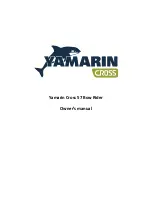
6
and a material identification, such as aluminum or stainless steel. The first number is the
diameter and the second is the pitch. The diameter is the distance across the circle swept by
the extreme tips of the propeller blades. The term pitch comes from the old screw analogy used
to approximate propeller action. This analogy says that a propeller screws itself through the
water much as a wood screw works itself into soft pine. The pitch is the angle of the blades
expressed in the theoretical distance a propeller would travel in each revolution. In the above
example the propeller would advance 17” on each revolution. In reality, the propeller actually
pushes the boat forward less distance than its pitch. The difference between the pitch and the
actual distance traveled is called “slip”.
Propulsion
The engine manufacturer supplies all vital information concerning your engines in the operation
and maintenance manuals. Details of important engine maintenance schedules, lubrication
system, cooling system and engine alert systems are outlined in these manuals. Your
familiarization with this engine reference material will result in the proper usage and service that
is essential for safe and enduring engine performance.
Engine Systems
Do not attempt to service any engine or drive component without being totally familiar with the
safe and proper service procedures. Certain moving parts are exposed and can be dangerous.
Throttle/Shift Control
The engines throttle/shift functions are located at the helm
station. The single lever used on each control box activates the
gear and throttle actions.
Neutral Safety
Your outboard powered boat contains a neutral safety switch
which prevents the engine from being started in gear. When
starting your engine the control lever must be placed in the
neutral/middle position. When functioning properly, this
mechanism does not allow the engine to start when the control is
not in the neutral position.
Shift
After your engine is started simply move the control lever in to the
forward detent position. To place the engine in reverse, move the
control lever backwards to the reverse detent location.
Remember that propellers are designed for maximum forward
thrust so reverse thrust will not be as efficient.
Throttle
Forward Throttle: To engage the throttle mechanism while in forward gear move the lever
forward past the detent in a controlled motion. This motion will begin to increase engine RPM
which will cause the boat to move forward.
Reverse Throttle
: To engage the throttle mechanism in reverse, continue to move the lever
forward (back or aft) past the detent in a controlled motion. This motion will begin to increase
engine RPM which will cause the boat to move backwards.







































